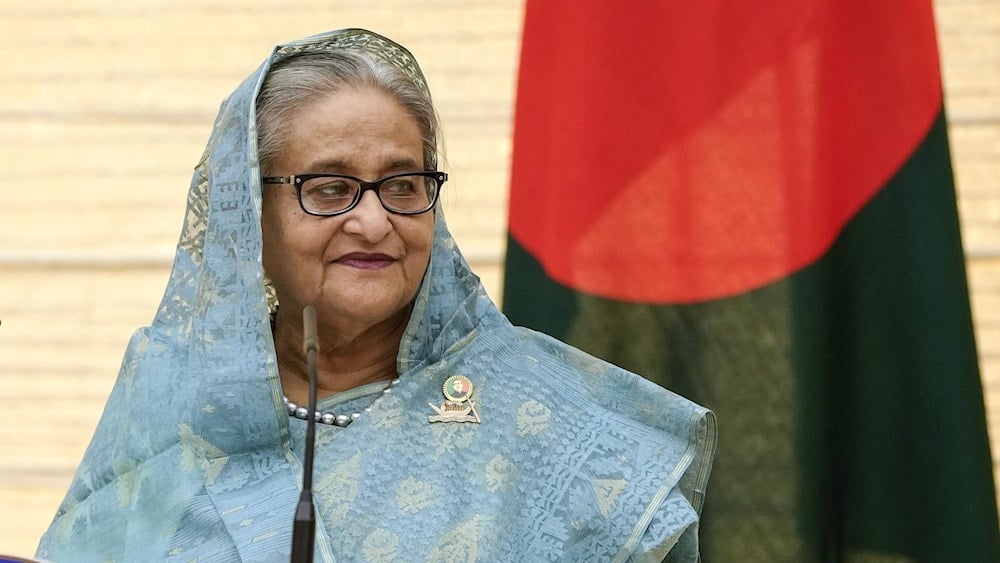Student protesters demand Bangladesh PM resign, army backs protesters
Student protest leaders demand the prime minister "must resign and she must face trial" following last month's violent protests.
-

Bangladesh's Prime Minister Sheikh Hasina speaks during a joint press statement with the Japanese Prime Minister at his official residence in Tokyo on April 26, 2023. (AFP)
Mass protests have sparked in Bangladesh with thousands of demonstrators gathering in a central Dhaka square on Sunday, demanding Prime Minister Sheikh Hasina resign following a deadly police crackdown.
"Prepare bamboo sticks and liberate Bangladesh," Asif Mahmud, one of the leaders of the Students Against Discrimination Movement, wrote on Facebook on Sunday.
Although the Bangladeshi army was deployed to restore order in last month's violent protests where over 200 people were killed, several former army personnel joined the student movement. Ex-army chief General Ikbal Karim Bhuiya put a red profile picture on his Facebook to showcase his support for the movement.
Army Chief Waker-uz-Zaman spoke to officers at the Dhaka military headquarters on Saturday, stating that the "Bangladesh Army is the symbol of trust of the people".
"It always stood by the people and will do so for the sake of people and in any need of the state," he said, according to an army statement issued late Saturday.
Despite the statement indicating the army supports the people, it did not explicitly state they backed the anti-quota protests.
Students in Bangladesh mobilizing to call on Sheikh Hasina to resign
Order was momentarily restored by the deployment of troops, but after the Friday prayers in the country with a majority of Muslims, large crowds took to the streets in response to a request by student groups to pressure the government into making further concessions.
Students Against Discrimination encouraged its fellow citizens to begin a full-scale campaign of non-cooperation on Sunday.
The group's Asif Mahmud relayed to AFP, "This includes non-payment of taxes and utility bills, strikes by government workers and a halt to overseas remittance payments through banks," adding on Facebook, "Please don't stay at home. Join your nearest protest march."
Students want Hasina to issue a public apology for the violence that occurred last month and for firing some of her ministers.
Additionally, they have demanded that the government reopen the nation's colleges and universities, all of which were closed during the height of the upheaval. Chants from the street crowd called for Hasina's resignation.
Prime Minister Hasina, 76, has been in power since 2009 and secured her fourth consecutive term in January following an election widely criticized for lacking genuine opposition. Her administration faces allegations from human rights groups of manipulating state institutions to consolidate power and suppress dissent, including accusations of extrajudicial killings of opposition activists.
The protests began in early July in response to the reinstatement of a quota system for government jobs, which was later reduced by the Supreme Court. This system, which allocated more than half of all government positions to specific groups, stirred frustration among graduates amid a severe employment crisis affecting around 18 million young Bangladeshis. Critics argue that the quota was used to fill public positions with loyalists of the ruling Awami League.

 3 Min Read
3 Min Read










